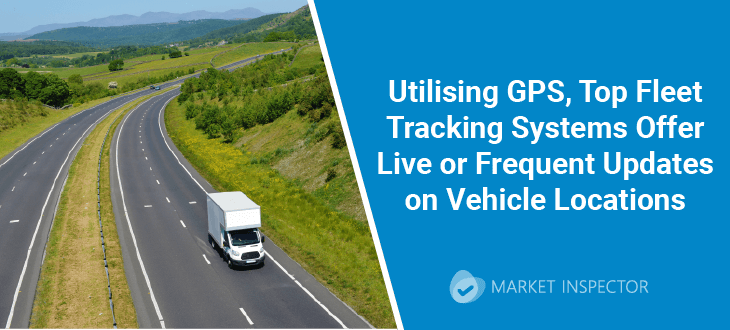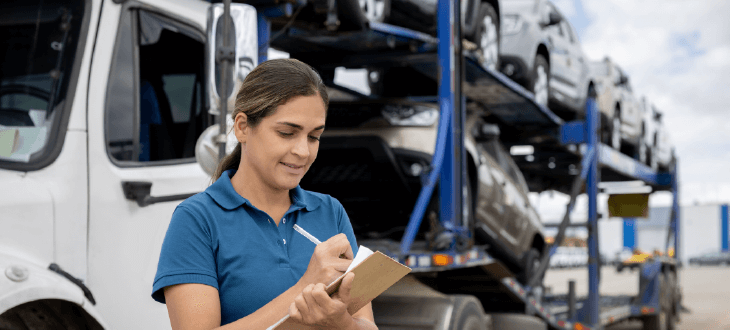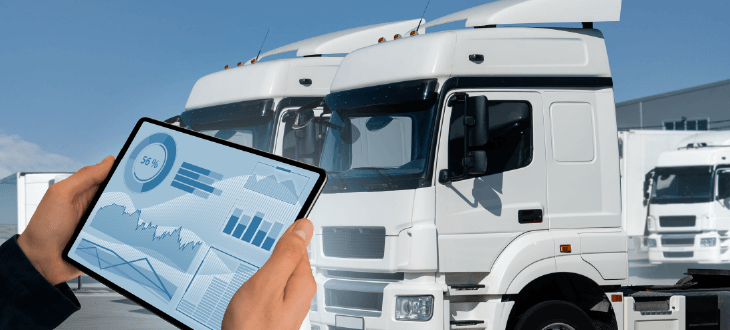Answer these simple questions and we will find you the BEST prices
Which type of solar quotes do you need?
It only takes 30 seconds
100% free with no obligation

Get up to 4 quotes from our selected suppliers by filling in only 1 form

Save money by comparing quotes and choosing the most competitive offer

Our service is 100% free and with no obligation
- Market-Inspector.co.uk
- Vehicle Tracking
- Fleet tracking
Should You Adopt Fleet Tracking For Your Business?


- Fleet management becomes more streamlined and efficiency is enhanced through fleet tracking. By leveraging GPS technology, leading fleet tracking systems provide real-time or regular updates on the whereabouts of vehicles.
- SMBs benefit from enhanced route efficiency and operational cost reductions, transitioning from manual tracking methods to streamlined fleet management tracking systems.
- Large businesses leverage fleet tracking services for data-driven insights and scalability, enhancing oversight across extensive fleet operations.
In today’s fast-paced world, fleet tracking has emerged as a cornerstone for businesses aiming to enhance efficiency and reduce operational costs.
The 2024 Fleet Technology Trends Report by Verizon Connect, a fleet management software company, underscores the vital role of fleet management technology in navigating challenges businesses may face.
By understanding fleet tracking systems' capabilities, costs, and benefits, your business can make informed decisions to enhance its operational efficiency and competitive edge.
This guide explores the specifics of fleet tracking, highlighting its advantages and how it can significantly benefit your business.
- Describe your needs
- Get free quotes
- Choose the best offer
It only takes 30 seconds

What is fleet tracking?
Fleet tracking technology is essential for business owners managing any number of vehicles.
According to insights from Trakm8, a UK-based tracker installation company, fleet tracking streamlines fleet management and boosts efficiency. Utilising GPS, top fleet tracking systems offer live or frequent updates on vehicle locations.
Advanced fleet telematics go further, providing insights into vehicle performance and usage, including fuel consumption, idling times, both real-time and historical locations, battery status, braking patterns, vehicle faults, and collision data.
This comprehensive monitoring is crucial for optimising fleet operations and enhancing decision-making.
At its core, GPS fleet tracking embodies the integration of GPS technology and software solutions to monitor and manage the movements and statuses of vehicles within a fleet.
This technology has seen significant advancements, from basic location tracking to providing in-depth analytics on vehicle health, driver behaviour, and operational efficiency.
Shifting trends 2024

This year presents both promising prospects and challenges for fleet operations, necessitating adaptations to rapid technological progress and increasing demands for service excellence, according to Fleet World Group.
Implementing fleet management software and fleet tracking systems will be crucial for smarter operations, offering real-time data critical for enhancing efficiency and guiding informed decisions.
Digital tools aimed at improving driver well-being and streamlining workflows will be instrumental in addressing the commercial driver shortage and promoting retention.
Moreover, adhering to stricter environmental regulations will be essential, with a special emphasis on CO2 emissions reporting and compliance to uphold a robust corporate reputation and meet standards such as the UK Sustainability Disclosure Standards (UK SDS).
Average costs
The fleet tracker market offers a range of solutions, with costs varying by fleet size, type of system or solution, and vehicle type.
Monthly subscriptions can range from £15 to £50 per vehicle, encompassing fleet tracking software subscriptions, hardware, and installation, offering a scalable solution for businesses of all sizes.
Costs vary based on fleet size, system type, and vehicle type. For small fleets, a basic GPS tracking system might start from £15 per vehicle per month, scaling up to £50 for advanced features. Larger fleets benefit from custom pricing, often resulting in lower per-vehicle costs.
These figures reflect not just a subscription model but also the integration of software solutions and hardware installation.
Legal compliance
In the UK, employing a fleet vehicle tracking system necessitates adherence to privacy and data security laws, including GDPR. Businesses must navigate these fleet tracking laws with care, ensuring transparency and compliance in their fleet monitoring practices.
It is crucial to navigate the UK's GDPR and data protection laws, ensuring that tracking practices respect privacy and are transparently communicated to all drivers.
When are fleet tracking solutions most beneficial?

For small- to medium-sized businesses - SMBs - adopting fleet tracking can streamline operations, improve route efficiency, and enhance customer service through accurate ETAs.
Before implementation, SMBs may struggle with manual tracking, leading to inefficiencies and higher operational costs. Post-adoption, the benefits include reduced fuel consumption, better compliance with maintenance schedules, and improved safety records.
Large businesses see significant advantages in scalability, data analytics, and integration with existing systems. Fleet tracking enables large enterprises to manage extensive fleets across multiple locations, optimise logistics, and make data-driven decisions.
However, businesses relying on non-motorized fleets or operating within a confined area may not find the investment in fleet tracking justifiable.
Installing the best fleet trackers
Fleet tracking devices vary widely based on the type of vehicle, cost, and the specific system or solution they offer. These trackers help businesses to optimise operations, ensure vehicle security, and improve overall fleet management.
Let's explore the most common types of tracker devices used for fleets, differentiate them by vehicle type, cost, and system or solution, and then match each with its appropriate installation process.
Types of tracker devices
Tracker devices are essential in vehicle management and safety, offering diverse functionalities for specific needs. These devices not only track and monitor vehicles but also provide crucial data that boosts operational efficiency and security. Here, we explore four primary types of tracker devices, each designed for different vehicle types and requirements:
GPS trackers
- Vehicle type: Universal, suitable for cars, vans, lorries, and even motorcycles.
- Cost: Moderate to high, depending on features like real-time tracking and historical data.
- System or solution: Provides real-time location data, route history, geofencing, and sometimes driver behaviour analytics.
OBD (On-Board Diagnostics) trackers
- Vehicle type: Most modern cars and vans with an OBD II port.
- Cost: Low to moderate, offering a cost-effective solution for basic tracking needs.
- System or solution: Easy to install, providing data on vehicle health, real-time location, and sometimes driving patterns.
RFID (Radio Frequency Identification) trackers
- Vehicle type: Suitable for managing large fleets of vehicles or equipment, including construction machinery.
- Cost: Varies widely; generally more cost-effective for tracking multiple assets.
- System or solution: Often used for inventory management, asset tracking, and access control within a limited range.
Dash cam trackers
- Vehicle type: Universal, but particularly beneficial for commercial vehicles where driver safety and incident recording are priorities.
- Cost: Moderate to high, with the added benefit of visual evidence.
- System or solution: Combines video recording with GPS tracking, often including features like live streaming, incident alerts, and driver behaviour monitoring.
The installation process for fleet tracking devices varies by type. GPS trackers usually require professional installation, involving hardwiring into the vehicle's power system and mounting in a discreet location to prevent tampering.
OBD trackers offer a plug-and-play solution, easily inserted into the vehicle's OBD II port for quick setup without professional assistance.
RFID tracker installation can vary, often necessitating technical setup of RFID tags on vehicles or assets and readers in strategic locations.
Dash cam trackers typically need mounting on the windshield or dashboard, connecting to the vehicle’s power supply, and software configuration, with some requiring professional installation to ensure correct positioning and secure connection.
Best fleet tracking solutions features

Modern fleet tracking transcends mere location tracking, incorporating GPS tracking for fleet vehicles and software solutions that offer a myriad of features.
For business owners, choosing a fleet tracking app is about immediate needs and future-proofing their operations. Features that offer detailed insights, promote safety, and integrate seamlessly with existing business systems stand out as more beneficial, driving long-term operational success and strategic advantage.
The right fleet-tracking app streamlines day-to-day operations and paves the way for data-driven decision-making and sustainable growth.
Basic tier
The basic fleet tracking systems offer real-time location tracking and geofencing, suitable for businesses seeking straightforward fleet tracking devices. These systems are also essential for operational efficiency.
They offer real-time location tracking and this is a foundational feature, enabling businesses to monitor vehicle locations, ensuring timely deliveries and responses. Also, they incorporate destination arrival alerts, these alerts note when the vehicles reach their destinations. This feature is fundamental for time-sensitive operations and customer satisfaction.
Advanced tier
The advanced tracking tier offers analytics on driver behaviour and vehicle health, tailored for businesses prioritising efficiency and safety. It also tracks driving safety and compliance.
Within driver behaviour monitoring, the system tracks speed, braking, and driving patterns, crucial for promoting safe driving practices and reducing wear on vehicles.
Meanwhile, the geofencing feature allows businesses to create virtual boundaries, sending alerts for unauthorised vehicle use or deviations from planned routes, enhancing security and compliance.
Top tier
The top-tier tracking systems provide strategic insights and optimisation. This tier features predictive analytics and integrated communication tools, designed for enterprises requiring comprehensive fleet tracking solutions.
Beyond basic tracking, these features offer analytics on fuel consumption, idle times, and route efficiency, enabling cost reduction and environmental sustainability. Also, predictive maintenance alerts utilise vehicle data to predict maintenance needs, preventing breakdowns and extending vehicle life, a key factor in operational reliability and cost efficiency.
This tier also incorporates customisable reports which provide insights into fleet performance, identifying opportunities for improvement and strategic decision-making. This tier also makes scalability possible, for example, the chosen tracking app can grow with your business, accommodating more vehicles and tracking needs without a drop in performance.
How to leverage fleet monitoring data
Utilising fleet monitoring data enables businesses to refine operational strategies, enhancing efficiency, safety, and growth. This data-driven approach supports optimised route planning, improved driver performance, and reduced operational costs. Let’s take a look at these in more detail.
- Vehicle utilisation reports: Your business can analyse how each vehicle is being used, identifying underutilised assets or those nearing the end of their lifecycle.
- Fuel consumption reports: You can track fuel efficiency across the fleet, highlighting opportunities to reduce fuel consumption through better route planning or driver training.
- Maintenance alerts: These allow you to have automated alerts for scheduled maintenance or unexpected issues, based on vehicle diagnostics, preventing costly repairs and downtime.
- Driver behaviour analysis: You can gain reports on speeding, harsh braking, or rapid acceleration to identify risky driving behaviours and implement corrective training programs.
- Route efficiency reports: This allows you to compare planned routes versus actual routes driven to identify discrepancies and optimise routes for future efficiency gains.
Business owners can leverage fleet data to enhance decision-making, optimise fleet performance, and reduce operational costs.
By analysing patterns and trends, businesses can identify areas for improvement, such as route optimisation, driver training programs, and maintenance schedules, leading to significant cost savings and improved service quality.
Are fleet tracking systems worth it?

The investment in fleet tracking systems yields significant returns, from direct cost savings to enhanced operational efficiency and competitive advantage, underscoring the value of fleet tracking in today's business landscape.
Considering the initial and ongoing costs of fleet tracking systems, the return on investment becomes apparent through direct and indirect savings.
Businesses report reduced fuel costs, lower insurance premiums, and improved customer satisfaction. Even for small fleets, the efficiency gains and potential for growth justify the investment.
The price of fleet tracking solutions can differ greatly depending on the necessary features, fleet size, and the selected hardware.
- Subscription-based models: These typically range from £15 to £50 per vehicle per month. The variance in cost is often related to the sophistication of the software solution, the frequency of data updates, and the level of customer support provided.
- Hardware costs: Initial hardware costs depend on the type of tracker and its installation requirements. Simple plug-and-play devices might be less expensive, while advanced trackers with additional sensors for monitoring vehicle health or driver behaviour could be more costly.
- Installation: Installation costs can vary. Some systems are designed for easy self-installation, while others require professional installation, adding to the initial setup cost.
- Total cost of ownership: Besides subscription and hardware costs, consider the potential savings from reduced fuel consumption, lower insurance premiums, and decreased maintenance costs, which can significantly offset the initial investment.
Many fleet tracking options are available with different features and prices, making it simple to find the right one for your business and budget. Start looking at customized quotes now to make your fleet more efficient and save money.
- Describe your needs
- Get free quotes
- Choose the best offer
It only takes 30 seconds

FAQ
Monitoring a fleet is achieved through GPS fleet tracking software and devices, providing real-time insights into vehicle locations and performance.
Monitoring a fleet efficiently requires a combination of GPS trackers installed in each vehicle and a sophisticated fleet management software system. This setup allows for the real-time tracking of vehicle locations, but its capabilities extend beyond location tracking.
Fleet management software can analyse various data points to offer insights into vehicle performance, driver behaviour, and overall fleet efficiency.
Fleet tracking solutions enable the generation of reports on fuel efficiency, maintenance needs, driver behaviour, and route optimisation.
The reports generated from fleet tracking systems are instrumental in optimising fleet performance and reducing operational costs.
Yes, within the framework of UK employment law, ensuring that fleet tracking practices are transparent and fair. Using fleet trackers for disciplinary purposes requires careful consideration of UK employment laws and privacy regulations, such as the GDPR. Transparency and fairness are paramount.
Businesses must have clear policies on how fleet tracking data will be used, including for disciplinary purposes. These policies should be communicated to all employees.
In some cases, obtaining explicit consent from drivers for the specific use of tracking data for performance monitoring might be necessary. Also, ensure all personal data collected through fleet tracking is stored securely and used in compliance with privacy laws.
Costs for fleet tracking range from £15 to £50 per vehicle per month, varying based on system complexity and included services.
The cost of fleet tracking systems can vary significantly based on the features required, the size of the fleet, and the chosen hardware.

Nicole Bea Kerr is a content writer for Market Inspector, leveraging her experience in B2B journalism and editing. She is interested in bringing more awareness to sustainability and helping businesses make informed choices through insightful narratives.
We strive to connect our customers with the right product and supplier. Would you like to be part of Market Inspector?

